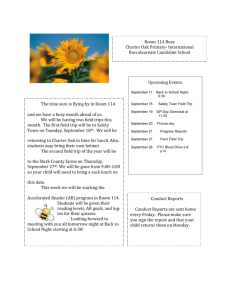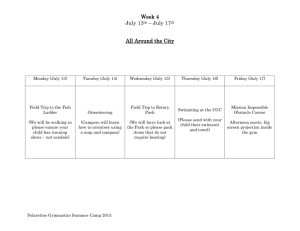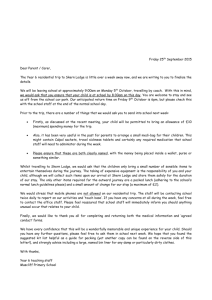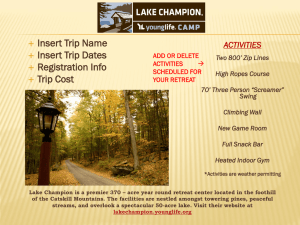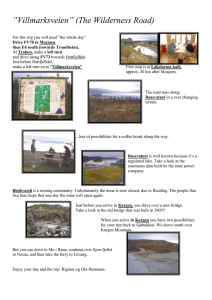HAZARD CHECKLIST FOR OVERSEAS RISK ASSESSMENT Name
advertisement
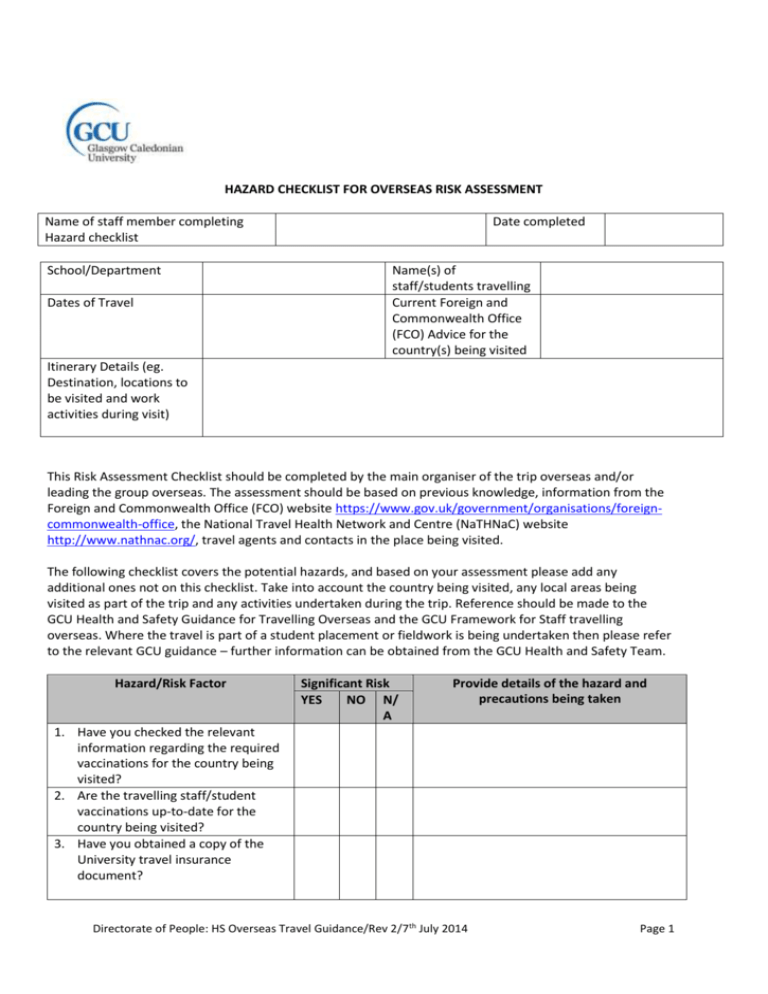
HAZARD CHECKLIST FOR OVERSEAS RISK ASSESSMENT Name of staff member completing Hazard checklist School/Department Dates of Travel Date completed Name(s) of staff/students travelling Current Foreign and Commonwealth Office (FCO) Advice for the country(s) being visited Itinerary Details (eg. Destination, locations to be visited and work activities during visit) This Risk Assessment Checklist should be completed by the main organiser of the trip overseas and/or leading the group overseas. The assessment should be based on previous knowledge, information from the Foreign and Commonwealth Office (FCO) website https://www.gov.uk/government/organisations/foreigncommonwealth-office, the National Travel Health Network and Centre (NaTHNaC) website http://www.nathnac.org/, travel agents and contacts in the place being visited. The following checklist covers the potential hazards, and based on your assessment please add any additional ones not on this checklist. Take into account the country being visited, any local areas being visited as part of the trip and any activities undertaken during the trip. Reference should be made to the GCU Health and Safety Guidance for Travelling Overseas and the GCU Framework for Staff travelling overseas. Where the travel is part of a student placement or fieldwork is being undertaken then please refer to the relevant GCU guidance – further information can be obtained from the GCU Health and Safety Team. Hazard/Risk Factor Significant Risk YES NO N/ A Provide details of the hazard and precautions being taken 1. Have you checked the relevant information regarding the required vaccinations for the country being visited? 2. Are the travelling staff/student vaccinations up-to-date for the country being visited? 3. Have you obtained a copy of the University travel insurance document? Directorate of People: HS Overseas Travel Guidance/Rev 2/7th July 2014 Page 1 4. Climate - Is the country being visited known for climatic extremes e.g. dry/desert/intense sun, storms/typhoons, monsoon/high humidity, extremes of hot/cold, avalanche, earthquake, volcano, tidal extremes, oxygen deficiency etc? (take into consideration the risk if outdoor work is involved). 5. Is the country being visited known for Civil unrest, political tension, risk of kidnaps/abductions, muggings/robbery, vandalism/violence, crime? 6. Have any local environment issues been evaluated e.g. culture, customs, dress, religion, local laws/other standards, language/communication difficulties, legal differences? 7. Physical Hazards – will the trip involve any severe terrain exposure? e.g. mountains, cliffs, glaciers, crevasses, ice falls, caves, mines, quarries, forests, fresh water, sea and seashore, marshes and quicksand. 8. Biological Hazards – during the trip is there a risk of contact with wild/domestic venomous/aggressive animals, insects, reptiles e.g., bites, stings, dermatitis, rabies etc. (Nb: ensure all relevant vaccinations are up-todate) 9. Biological Hazards – during the trip is there any soil or plant risks involved, for example, during fieldwork? 10. If equipment is being taken, is it fit for purpose, suitable for transport, maintained, capable of repair on site, instruction for proper use available, is any back-up equipment required? 11. If electrical equipment is being taken, is it compatible? ( e.g. safety standards etc). 12. Is there a risk of contaminated food and/or water during the trip? (e.g. is drinkable water available or Directorate of People: HS Overseas Travel Guidance/Rev 2/7th July 2014 Page 2 water purification tablets required/available) 13. Is there a risk of disease or ill-health from food and drink, for example, allergy, diarrhoea, legionella, tetanus etc? 14. Is there a risk of any health issues e.g. Contaminated needles/sexual contact – HIV, Hepatitis B, asthma/allergies, diseases & parasites, for example, Lyme’s disease, malaria, rabies, leptospirosis, yellow fever, tapeworms, Hepatitis A, cholera, polio, typhoid, dysentery, tetanus? (Nb: ensure all relevant vaccinations are up-to-date) 15. Is there a risk of ill-health due to pollution, radiation etc 16. Will the trip involve any high hazard work (e.g. excavation, confined spaces where a permit to work or a safe system of work is required)? 17. Will the trip involve working with any hazardous substances/chemicals? 18. For fieldwork/outdoor work – has food provisions, preparation, storage and availablitiy of fuel for cooking being taken into consideration? 19. Have any special dietary needs been actioned? 20. Has the transportation been assessed – competent drivers, suitable transport, terrain, suitability and maintenance of vehicle? 21. Communication – has a method of routine and emergency communication been established and are accident and emergency plans in place? 22. Stress – take into consideration, for example, excessive schedule, accommodation problems, remoteness, sickness, lack of support, fatigue? Directorate of People: HS Overseas Travel Guidance/Rev 2/7th July 2014 Page 3 23. Emergencies – are arrangements for first aid and other assistance including contact numbers in place? 24. Access arrangements in place, for example, permission to work at site obtained, if needed, provision made for disabled, if needed; additional insurance, if necessary, arranged? 25. Where any staff/students going on the trip have declared a pre-existing medical issue that may affect their ability to travel - have they been cleared for travel by their GP? (Please provide further details in section 36) (A GP can be consulted if there are any doubts. All travel companies make arrangements if they are given adequate notice). 26. Where there is a particular risk of infection or injury, have you made arrangements for an appropriate first aid kit? 27. Has any training been identified and has this been completed? 28. Have the staff/students travelling been informed of health and safety information for the trip including long haul flight risks, for example, DVT ? 29. Have the emergency numbers for the country being visited been issued to all staff/students on the trip? 30. Have the staff/students on the trip been advised of what is expected of them? 31. Have staff/student ratios have been considered, if appropriate? 32. For specialist or hazardous activities, has the competency of all staff/leaders on the trip been assessed as adequate? 33. Has contingency been made in the event of travel interruption, accommodation, business plans? Directorate of People: HS Overseas Travel Guidance/Rev 2/7th July 2014 Page 4 34. Is there any other hazards associated with the trip? 35. Emergency Details Please provide the following information (where several staff/students are travelling, a separate sheet to log names/contact numbers etc may be required): Main contact at GCU (Name/telephone number): ……………………………………………………………………………………………………………………………………………………………….. Emergency contact for you on placement (Name/address/telephone number): ………………………………………………………………………………………………………………………………………………………………… Main contact at overseas host University/local agency/Other (Name/telephone number/email): ………………………………………………………………………………………………………………………………………………………………… Staff/student name(s) and registration number(s): ……………………………………………………………………………………………………………………………………………………………….. Staff/student contact number(s): …………………………………………………………………………………………………………... Next of Kin name (please note relationship) and contact number (if different from above) for staff/students on trip: ……………………………………………………………………………………………………………………………………………………………….. Staff/student medical issues: …………………………………………………………………………………………………………………. (Note: no member of staff or student is permitted to travel on University business against the advice of their GP) Note: In the event of an emergency, please provide 24 hour contact numbers, for example, mobile, home, work, hotel, etc Head of Department Signature: ………………………………. Date: ……………………………………. Directorate of People: HS Overseas Travel Guidance/Rev 2/7th July 2014 Page 5



